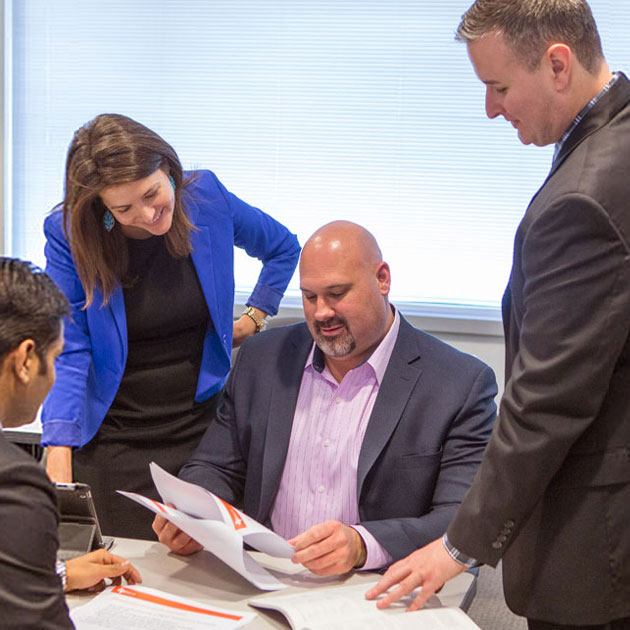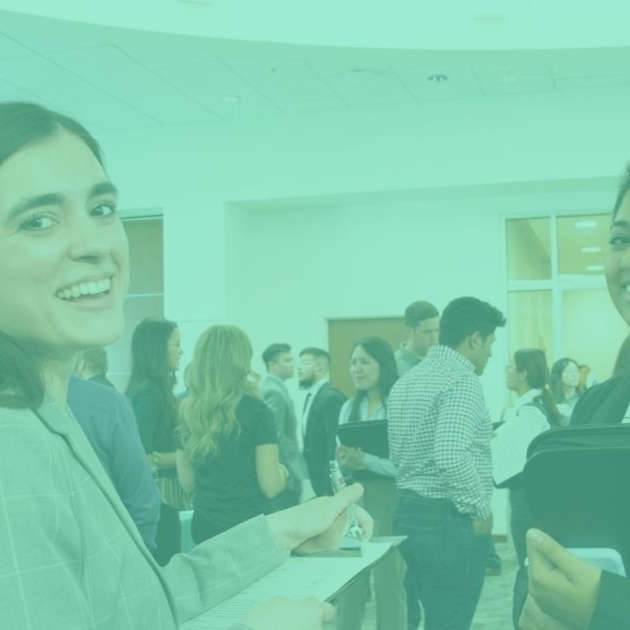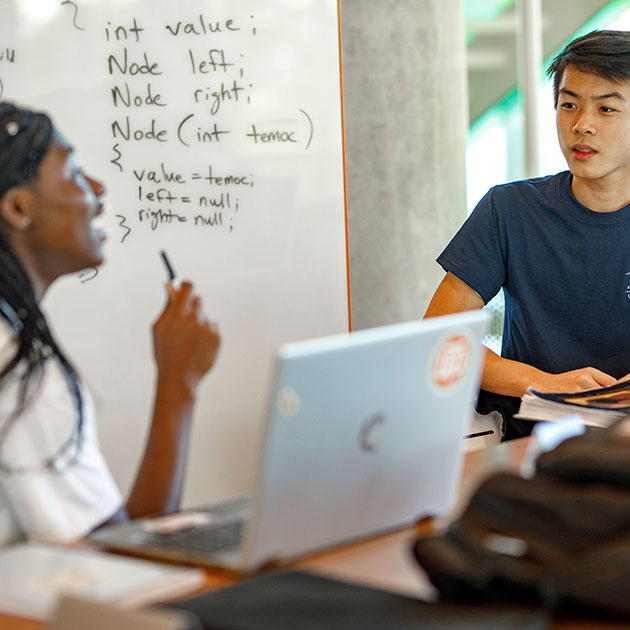Contents
- Q: What attracted you to the program at UT Dallas?
- Q: Tell us about your app and the development process.
- Q: What change do you hope to facilitate with this?
- Q: What success have you seen with the application so far?
- Q: Do you have any plans to expand on this idea or create more apps in the future?
- Q: Would you say UT Dallas helped you in seeing this idea become a reality?
- Q: Have you had a mentor?
- Q: When you graduate, what do you want to do?
- Q: Where would your dream job be?
- Q: Do you ever want to be a politician?
- Q: What has creating this app taught you?
- Q: What advice do you have for students wanting to follow in your footsteps?
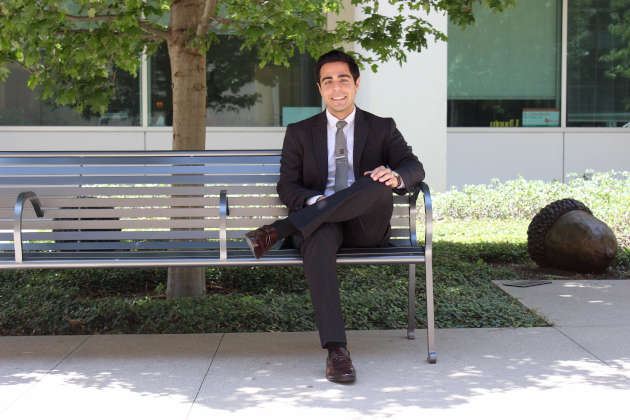
Kamiar Kordi, a student in the Jindal School’s Master of Finance program, is not satisfied with being a mere student. After completing his undergraduate education at Texas A&M University, serving as the vice president of student government’s Diversity Commission, starting the school’s first human rights charter and graduating with degrees in economics and political science, Kamiar sought out a university that would carry his education further.
The University of Texas at Dallas, which boasts high diversity and student involvement, drew Kamiar in right away. After beginning his education at JSOM, Kamiar used his newly learned entrepreneurial skills to create Policentric. With this nonprofit app, available on Android and iOS, Kamiar hopes to revolutionize politics, starting this election cycle, by increasing awareness and connection between constituents and their representatives. In his interview, Kamiar shares how UT Dallas helped him reach for success and how he hopes to make a change.
Q: What attracted you to the program at UT Dallas?
A: The quality of the Master’s of Finance program. The Financial Engineer ranked UT Dallas’ program No. 8 among the best programs in the U.S. last year. The location, growth and professors working here all contribute so much to the value. This is my hometown, so I saw it fitting to come back to Dallas, be around family for a while and attend a quality school. We are lucky to live in Texas and have so many good schools around us. We take it for granted, but we live so close to world-class institutions.
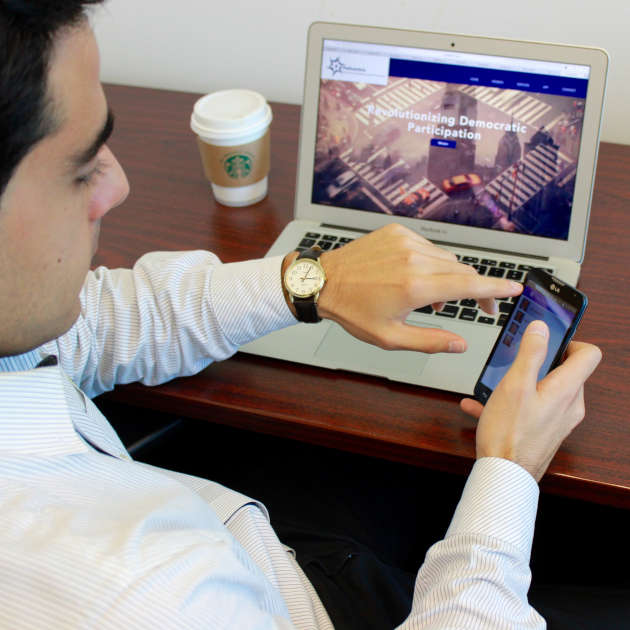
Q: Tell us about your app and the development process.
A: The Policentric app puts you in power. It shortens the information gap between constituents and their representatives, allowing users to stay up to date with the policy actions pursued by their elected officials, providing a direct system of checks and balances for the constituents.. It helps to sift through all the jargon they speak prior to being elected, and ensure they are on track, and focus on the things you care about. There are a variety of ways this app does that. One way is it gives you the full voting record of the representative as well as information about what bills they have adopted or pursued in Congress, then a link to that representative’s contact information. This allows users to contact their representative without dealing with Internet searches or outdated information. The information is on-screen and will connect them directly to their office, email, or route a navigation path to their office in maps. You can select a policy issue you are concerned about and email them directly from your phone. Policentric then keeps a record of the issues of concern people have emailed about within the app. We tabulate the aggregate data anonymously and allow people to see what everyone else in their ZIP code, state or country as a whole is more concerned about. This connects back to the accountability feature by allowing people to see whether their [elected officials] are advocating for what their community needs most. The great thing about this nonprofit is that it’s a puzzle. You can always add on to it.
Q: What change do you hope to facilitate with this?
A: During these times marked by economic stagnation and rapid automation, it’s critical that politicians listen to their constituents. A lot of jobs are disappearing because of this shift, at no fault of the people, and many peoples’ happiness is at stake. If politicians are involved in government for their own personal incentives, it will create a very dangerous path for our country. There were times in our society when major actions were taken that shifted the future, such as Abraham Lincoln abolishing slavery. That was a major shift where someone took responsibility, went against the grain and had the forethought to know the benefits and outcomes of his actions. We need more politicians who are willing to stand up, go against the grain and get us back on track. We are deviating from America’s great path, and I want this app to facilitate the steps back in the right direction.
Q: What success have you seen with the application so far?
A: Right now, we haven’t marketed to the public because we want to have a fully ready, glitch-free product on Android and iOS before we go public. Apple has a very stringent process for its applicants, and they haven’t had many apps dealing with social data; where people enter voluntary personal information to be turned into aggregate data. So we have been working closely with them to explain why this is needed and explain our privacy terms. Our crowning jewel is our email service, which has an expanded bandwidth, currently provided at no charge from Amazon. Due to the content of the app, and Amazon seeing its potential, we are working actively toward that success. I am very optimistic about where this app is going to go. By next semester, we hope to be fully functional on both major platforms and start promotion, though we really bank on our app gaining traction itself. Many people rush to release an app with bugs and glitches, but we’re really working on perfecting our application first.
Q: Do you have any plans to expand on this idea or create more apps in the future?
A: Creating more apps? This keeps me busy enough! They are fun, but a lot of work. Even the simple code structure of this app took six months, with two more after that for review. It’s fun, but this is definitely my only app for now. It’s a puzzle piece, which can allow for maximum benefit to society. The structure allows people to share information with us to benefit the users, the constituents — and ultimately, you.
Q: Would you say UT Dallas helped you in seeing this idea become a reality?
A: UT Dallas played an immense role in getting me to where I am now and launching the app. Madison Pedigo, my professor, was very influential in giving me confidence in the idea and in the direction it was headed. The lessons I learned from his class were very helpful and coincided at the exact right time with my fervor to get this app released. Dr. Caroline Reichert was my tester. Her family went through the app and sent me a thorough review. Dr. Kutsal Dogan, a board member of Policentric, has been there throughout the ups and downs, helping me think of ways to make the app better and efficient — useful and to the point. The critique of these individuals, and others like Dr. Robert Kieschnick and Dr. Arthur Selender in the Finance Area, is what kept me going forward. If they see value in the app and try to find ways to improve this app, there’s something for me to build on — it gives me motivation. A&M built my foundation, but UT Dallas has been there every step of the way helping me go far above that.
Q: Have you had a mentor?
A: I think everyone helped me so much in this process. It’s so hard to choose a specific individual because they were all mentors to me, including some of my undergraduate professors. It’s important to not limit yourself, to have many mentors you can learn from and look up to.
Q: When you graduate, what do you want to do?
A: Not sure yet. If my nonprofit is up to speed at that time, I would love to work on it full time. Life beyond UT Dallas offers a lot of chances for me. I would love to work in the international scene or nonprofit sector, making it coincide with my business venture, but time will tell. Once this becomes stable and I can pay employees, I intend to focus on this.
Q: Where would your dream job be?
A: Somewhere north, northeast. Dream job is the UN Development Program – UNDP. I really enjoy studying microfinance in my free time. Organizations like the UNDP, Grameen and FINCA, the leading international nonprofits in promoting development, would give me a great outlet for that passion. I would love to work in Washington, D.C., and help with the cause.
Q: Do you ever want to be a politician?
A: I don’t want to be the politician, I want to be the guy who keeps them in check. I want to be the politician police, protecting citizens from the Frank Underwoods of the real world.
Q: What has creating this app taught you?
A: The critical thing this app has taught me is to always be very cautious who I choose to include in my circle when working. Anytime you have the idea, choosing who you start working with is going to directly affect your success or failure. I was very careful to pick positive-minded people who saw the potential and added value of this app. It’s hard to sell something that doesn’t generate revenue in a business setting, so everyone had to believe in this wholeheartedly. This honed my skills in really reaching out and selling to people, and also opened a great partnership with many professors.
Q: What advice do you have for students wanting to follow in your footsteps?
A: There comes a point, as Dr. Kieschnick has told me, “where you jump.” The longer you wait and work on perfection, the quicker people are coming up with very similar ideas. Jump as early as possible. The younger you are, the less you have to lose. Younger people have fewer responsibilities and dependents. So don’t wait too long. The earlier to take the leap, the better. Kamiar, one of many bright and entrepreneurial minds at UT Dallas, embodies the spirit of the school by working actively to put the benefit of others first and foremost. His app, Policentric, seeks to become a new tool that voters can use to change the face of American politics themselves. For more information, visit the Policentric website.



